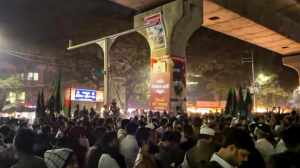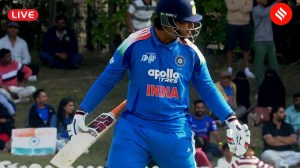Minister of State for Jal Shakti V Somanna said Thursday that Jal Jeevan Mission (JJM) operational guidelines were changed after considering requests from various states seeking Central support for meeting additional costs of raw materials increased due to the Covid-19 pandemic and Russia-Ukraine crisis.
In a written reply to Lok Sabha, Somanna said, “Considering the requests from various states seeking central support for meeting additional cost of raw materials increased due to Covid-19 pandemic and Russia-Ukraine crisis, requisite amendments were made in operational guidelines of the mission with effect from 21.06.2022 for sustaining the pace of implementation during mission period.”

Somanna’s reply came in response to a question asked by Samajwadi Party (SP) member Anand Bhadauriya, who wanted to know “whether the change in the tender rules under the JJM, which were removed a few years ago, has led to huge additional cost amounting to crores of rupees across the states”.
The government’s reply to questions regarding the change in operational guidelines, which resulted in an increase in cost, is significant in view of concerns in some government sections that the cost of JJM works was inflated in certain states.
On May 21, The Indian Express reported that an investigation into the data uploaded by states and Union Territories on the JMM dashboard showed that the crucial changes in the JJM guidelines three years ago had lifted the check on expenditure, leading to cost escalations.
This resulted in additional costs totalling Rs 16,839 crore for 14,586 schemes, an increase of 14.58 per cent from their estimated cost. At the time of the revision of the guidelines in June 2022, Gajendra Sigh Shekhawat was heading the Jal Shakti Ministry.
The payment of tender premium was prohibited in the original JJM guidelines issued in 2019. However, two-and-a-half years later, the Jal Shakti Ministry, with the approval of “competent authority”, made a crucial change in these guidelines on June 21, 2022. The ministry defined the “approved cost” and deleted two words “tender premium” from the suggestive list of inadmissible expenses. This paved the way for payment of tender premiums.
Story continues below this ad
Earlier this month, Jal Shakti Minister C R Patil stated that the Centre has halted the payment of tender premiums under the rural tap water scheme.
Tender premiums refer to the additional amount a bidder quotes, which is higher than the government’s approved cost.
Responding to a question at the Idea Exchange programme of The Indian Express, Patil said, “Tender premium ka bhugtan humne rok diya hai. Jo thha, jo gaya hoga woh alag baat hai, magar jo naya hai usse poori tarah hamne rok diya hai (We have stopped the payment of tender premium. What was there, what has gone is a different matter, but what is new has been completely stopped).”
In a written response to a question posed by Congress member Praniti Shinde, Somanna stated that a proposal to continue the JJM until 2028 with an enhanced total outlay is under consideration by the government.
Story continues below this ad
Shined had asked “whether the Government has sought an additional 2.79 lakh crore for the completion of the mission” and whether the “Expenditure Secretary-led panel has approved only a part of the requested amount and proposed a 46% cut in central funding support upto December 2028”.
In reply to Shinde’s question, Somanna said Finance Minister Nirmala Sitharaman, during her Budget speech 2025-26, announced extension of Jal Jeevan Mission until 2028 with “enhanced total outlay”.
“Accordingly, a proposal for continuation of Jal Jeevan Mission until 2028 with enhanced total outlay is under consideration of the Government,” Somanna said.
Since the launch of the JJM in 2019, 6.4 lakh water supply schemes with a total estimated cost of Rs 8.29 lakh crore – more than double the scheme’s original outlay of Rs 3.60 lakh crore (Centre: Rs 2.08 lakh crore, states: 1.52 lakh crore) – have been approved by the states.
Story continues below this ad
To meet the additional funding requirement, the ministry approached the Expenditure Finance Committee, headed by the Expenditure Secretary, to approve an additional Rs 2.79 lakh crore in Central funding over and above the existing Rs 2.08 lakh crore. But the EFC recommended only Rs 1.51 lakh crore as the Central share, 46 per cent lower than what was sought by the ministry, as reported by The Indian Express on April 21.
Like the Lok Sabha, members of the Rajya Sabha have also raised questions about the increase in the JJM cost due to the change in guidelines in 2022. On July 21, SP members Javed Ali Khan and Ramji Lal Suman asked the Jal Shakti minister about a change in the JJM guidelines and an increase in the cost.









